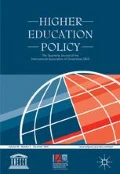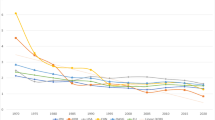Abstract
This study explores the dynamics of master’s education in Japan resulting from various internationalization policies through a comparison of master’s degree programs offered by Japan’s “Super Global Universities (SGUs)” and the country’s mass-market universities. Using case studies and interviews, the impact of internationalization policy and other external factors on the ecology of master’s programs is examined, and the way in which the master’s programs in these two different types of universities have reacted is analyzed. Although a common pattern of increases in the number of international students enrolled in these master’s programs was observed, responses to the internationalization policies and external environmental changes were found to be diverse. Based on the study’s findings, specific, targeted policies rather than broad generic policies aimed at promoting the internationalization of master’s education in Japan are needed. The recruitment of qualified students and a balance of Japanese and international students in master’s education is seen as a key to effectively implementing internationalization.


Similar content being viewed by others
References
Anzai, S., and Matsuzawa, C. (2013) ‘Missions of the Japanese National University Corporations in the 21st Century: Content Analysis of Mission Statements’, Academic Journal of Interdisciplinary Studies 2(2): 197–207.
Bradford, A, and Brown, H. (2017) English-medium Instruction in Japanese Higher Education: Policy, Challenges and Outcomes, Bristol: Multilingual Matters.
Burgess, C., Gibson, I., Klaphake, J., and Selzer, M. (2010) ‘The ‘Global 30’ Project and Japanese higher education reform: An example of a ‘closing in’ or an ‘opening up’?’, Globalisation, Societies and Education 8(4): 461–475.
Choudaha, R. (2017) ‘Three waves of international student mobility (1999–2020)’, Studies in Higher Education 42(5): 825–832.
Drennan, J. and Clarke, M. (2009) ‘Coursework Master’s Programmes: The Student’s Experience of Research and Research Supervision’, Studies in Higher Education 34(5): 483–500.
Ehara, T. (2004) Nippon no daigakuinkaikaku no syourai (The future of graduate school reform in Japan), Daigakuin no Kaikaku (Graduate School Reform), 279–291.
Ehara, T. (2007) ‘Reform of Japanese Graduate Education in the Late 1990s’, Ritsumeikan Higher Educational Studies (7): 75–87.
E-Stat (Portal Site of Official Statistics of Japan) (2019) Gakkou kihon chosa (Basic survey of schools) (As of 25 December 2019)., https://www.e-stat.go.jp/stat-search?page=1&toukei=00400001, accessed 22 April 2020.
Gerring, J. (2004) ‘What is a case study and what is it good for?’, The American Political Science Review 98(2): 341–354.
Japan Students Services Organization (JASSO) (2019, January) 2019 International Student Enrollment Survey Results, https://www.jasso.go.jp/about/statistics/intl_student_e/2018/index.html, accessed 23 October 2019.
Jung, J. (2019) ‘Learning experience and academic identity building by master’s students in Hong Kong’, Studies in Higher Education advanced online publication August 14 https://doi.org/10.1080/03075079.2019.1652811
Kingdon, J.W. (1995) Agendas, alternative, and public policies (2nd ed.), New York: Harper Collins.
Lomer, S. (2018) ‘UK policy discourses and international student mobility: the deterrence and subjectification of international students, Globalisation’, Societies and Education 16(3): 308–324.
Matland, R.E. (1995) ‘Synthesizing the implementation literature: The ambiguity conflict model of policy implementation’, Journal of Public Administration Research and Theory 5(2): 145–174.
Merton, R.K. (1968) ‘The Matthew effect in science: The reward and communication systems of science are considered’, Science 159(3810): 56–63.
MEXT Council Report (2011, 31 January), http://www.mext.go.jp/component/b_menu/shingi/toushin/__icsFiles/afieldfile/2011/03/04/1301932_01.pdf, accessed 23 October 2019.
MEXT Council Report (2015, 15 September 2015), https://www.meti.go.jp/policy/innovation_corp/entaku/pdf/151022_entaku4_siryo07-2.pdf, accessed 23 October 2019.
MEXT Council Report (2017, 24 July), http://www.mext.go.jp/component/b_menu/shingi/giji/__icsFiles/afieldfile/2017/07/24/1386653_05.pdf, accessed 23 October 2019.
MEXT Council Report (2018a, 10 July), http://www.mext.go.jp/b_menu/toukei/data/syogaikoku/__icsFiles/afieldfile/2018/07/10/1404260_03_1.pdf, accessed 22 April 2020.
MEXT Council Report (2018b, 25 December) http://www.mext.go.jp/component/b_menu/other/__icsFiles/afieldfile/2018/12/25/1407449_1.pdf, accessed 22 April 2020.
Noor, K.B.M. (2008) ‘Case study: A strategic research methodology’, American Journal of Applied Sciences 5(11): 1602–1604.
Ota, H. (2003) ‘The International Student 100,000 Plan: Policy Studies’, Center for Student Exchange Journal, 6: 27–51.
Ota, H. (2018) ‘Internationalization of higher education: Global trends and Japan’s challenges’, Education Studies in Japan: International Yearbook 12(March): 91–105.
Research Institute for Higher Education (ed.) (2004) Research on graduate education and academic degrees: Report of a nationwide survey, COE Research Series, Research Institute for Higher Education, Hiroshima University.
Research Institute for Higher Education (ed.) (2007) Study on graduate education and academic degree II, COE Research Series, Research Institute for Higher Education, Hiroshima University.
Research Institute for Higher Education (ed.). (2009) “Current status and issues of graduate school in Japan: Record of the 36th (2008) Researcher Meeting”, Research Institute for Higher Education, Hiroshima University.
Sato, I. (2019) 50 nenme no daigaku kaitai 20 nenme no daigaku saisei. [50th year of university destruction and 20th year of revival], Kyoto University Press.
Shimauchi, S. (2018) ‘English-medium instruction in the internationalization of higher education in Japan: Rationales and issues’, Educational Studies in Japan 12: 77–90.
Shimmi, Y. and Yonezawa, A. (2015) ‘Japan’s “Top Global University” Project’, International Higher Education 81(summer): 27–28.
Shin, J.C. and Kehm, B.M. (2013) ‘The world-class university in different systems and contexts’, in J.C. Shin and B.M. Kehm, B. M. (eds.). Institutionalization of World-Class University in Global Competition, Dordrecht: Springer, pp. 1–13.
Smith, T.B. (1973) ‘The policy implementation process’, Policy Sciences 4(2): 197–209.
Stromquist, N.P. (2007) ‘Internationalization as a response to globalization: Radical shifts in university environments’, Higher Education 53(1): 81–105.
Takeuchi, Y. (2016) Nihon no meritokurashi: kouzo to sinsei (Japan’s meritocracy: structure and mentality), University of Tokyo Press.
Wada, H. (2019) Rikei Daigakuin Kyoiku no Kokusaika (Internationalization of graduate education in science), 30–33, IDE Gendai no Koutou Kyouiku (Modern Higher Education).
Wedge. (2018) ‘The fierce competition for international students’, Wedge Magazine Guiding Japan Forward 30(12): 14–36.
Yamada, R. (2003) Daigakuinkaikaku no douko: senmonsyokudaigakuin no seibi to kakujuu (Trends in graduate school reform: Establishment and expansion of professional graduate schools), The Japan Society for the Study of Education 70(2): 148–164
Yonezawa, A. (2009) ‘Japanese university leaders’ perceptions of internationalization’, Journal of Studies in International Education 13(2), 125–142.
Yoshida, A. (2019) Nippon no Koutoukyouikuniokeru Diversityseisaku no Hensen (Changes in diversity policy in Japanese higher education), 4–9, IDE Gendai no Koutou Kyouiku (Modern Higher Education).
Acknowledgements
This paper was partly supported by the funding of Japan Society for the Promotion of Science (18K13196) and by the funding of International Joint Research Programs at Research Institute for Higher Education in Hiroshima University (S30001).
Author information
Authors and Affiliations
Corresponding author
Additional information
Publisher's Note
Springer Nature remains neutral with regard to jurisdictional claims in published maps and institutional affiliations.
Rights and permissions
About this article
Cite this article
Shimauchi, S., Kim, Y. The Influence of Internationalization Policy on Master’s Education in Japan: A Comparison of “Super Global” and Mass-Market Universities. High Educ Policy 33, 689–709 (2020). https://doi.org/10.1057/s41307-020-00204-y
Published:
Issue Date:
DOI: https://doi.org/10.1057/s41307-020-00204-y




